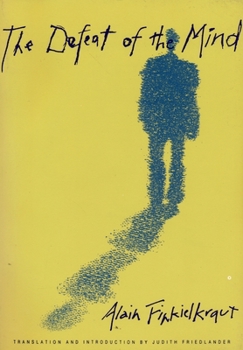The Defeat of the Mind
Select Format
Select Condition 
Book Overview
A passionate critique of Enlightenment--both in its contemporary invocation and its historical and cultural use--and a call to arms to rethink human equality and liberty without the sacrifice of... This description may be from another edition of this product.
Format:Paperback
Language:English
ISBN:0231080239
ISBN13:9780231080231
Release Date:April 1995
Publisher:Columbia University Press
Length:165 Pages
Weight:0.50 lbs.
Dimensions:0.6" x 5.5" x 8.0"
Customer Reviews
2 ratings
Deconstructing the deconstructionists
Published by Thriftbooks.com User , 15 years ago
One of the more astute contemporary observers of Western decline is the French writer Alain Finkielkraut. In "The Defeat of the Mind," he traces the lineage of the multiculturalist disease, which, he argues, has provided much of the impetus for a widespread abandonment of the intellect throughout the Western world. This stance, and subsequent tracts in the same vein, have earned him near-pariah status among most of the "intellectuals" of Western Europe. Finkielkraut considers multiculturalism to be a mutation of older rebellions against the Enlightenment. The Lumières, as Diderot, Voltaire, and the other Enlightenment thinkers are known, sought to elevate man to the highest possible level, bestowing upon him a mandate to perfect himself, to live according to universal principles. These principles, which would form the basis of a forward-thinking cultural and political community (and were an important inspiration for the U.S. Constitution), were considered the common heritage of mankind. One of the most powerful challenges to the Enlightenment was the rise of chauvinistic nationalism, as typified by the German Johann Herder (1744-1803). Herder rejected any notion of eternal categories, or of "man" as an autonomous entity. Instead, he argued that man's only valid spiritual home were the unique and mysterious qualities of the national group (volksgeist). Naturally, Herder was a partisan of the German volk, holding German culture, art, literature, and history above that of all other nations. Says Finkielkraut (all translations in this review are mine, from the French edition): "For all time--or, more precisely, from Plato to Voltaire--human diversity was judged before the tribunal of values; Herder came along and condemned all universal values in the tribunal of diversity." Herder can be contrasted to thinkers such as Goethe, who, while acknowledging the importance of the nation, argued that high culture is capable of transcending national boundaries. Both realms exist simultaneously; it is up to us to find the balance. Herder passed the anti-Enlightenment baton to later advocates of ethnocentrism, but also to the new, radicalized social scientists of the 19th century: the sociologists, linguists, and anthropologists. Dressed up as "progressives," they used a different approach to deny man his existence as an individual. Everything became dependent upon society, without which nothing can be explained. Instead of being a captive of his national affiliation, man was seen as a unit within his social class, animated purely by interests and other factors that were not of his own design. Fast forward to 1945. In the aftermath of the Second World War, efforts were underway to spread culture to the masses, in order to divorce them once and for all from chauvinistic ideologies, particularly those centered on the concept of race. UNESCO, for example, was founded at this time as a major vehicle for the propagation of Enlightenment values. Soon, however,
Multiculturalism und das Volk
Published by Thriftbooks.com User , 17 years ago
In this essay, French intellectual Alain Finkielkraut sketches an intellectual history of multiculturalism, and -surprisingly- finds its roots in two right-wing countercultural movements of the 19th Century: the volkisch ideology of German Europe (epitomized here by Herder), and the reactionary Catholic thought of writers like Joseph de Maistre and Donoso de Cortes. Both of these ideologies were explicitly anti-universalist and anti-democratic and both developed in reaction to the ideas of the Enlightenment and specifically the French revolution. Fundamentally, these thinkers all denied that Man is a universal category. Rather, each "volk" and its culture is unique. As such, cultural difference is ultimately more important than individual rights. (Is this starting to sound familiar?) In the words of de Maistre: "I do not know the Man as such. Never have. I have known Poles, French, English. Thanks to Montesquieu I am aware of the existence of the Persians as well, but I have never known the Man." Finkielkraut convincingly demonstrates how these racist 19th Century ideas corrupted 20th Century social science, and eventually led to the 21st Century ideology of multiculturalism. He suggests, persuasively, that this view of humanity as a collection of "peoples" is inescapably racist and collectivist, no matter how it is sugarcoated.




